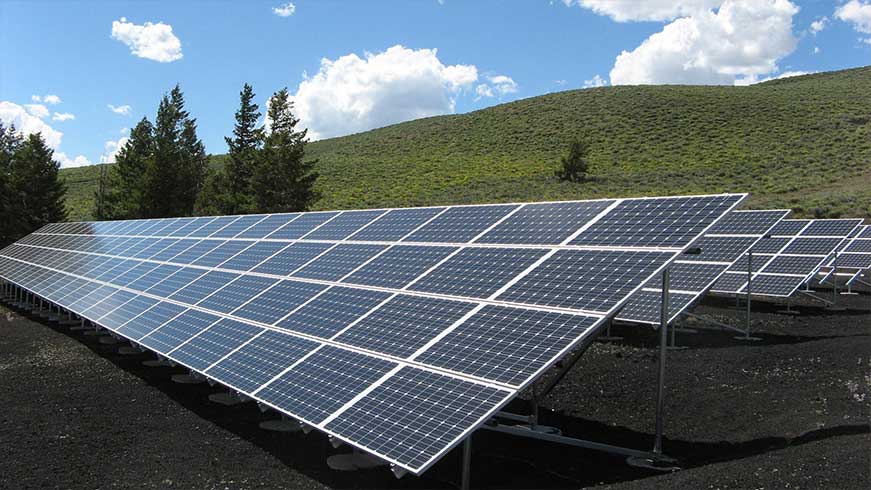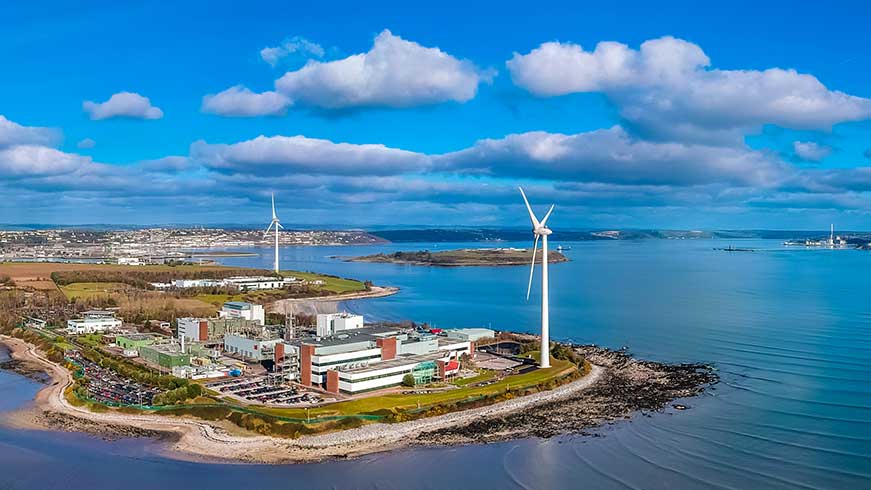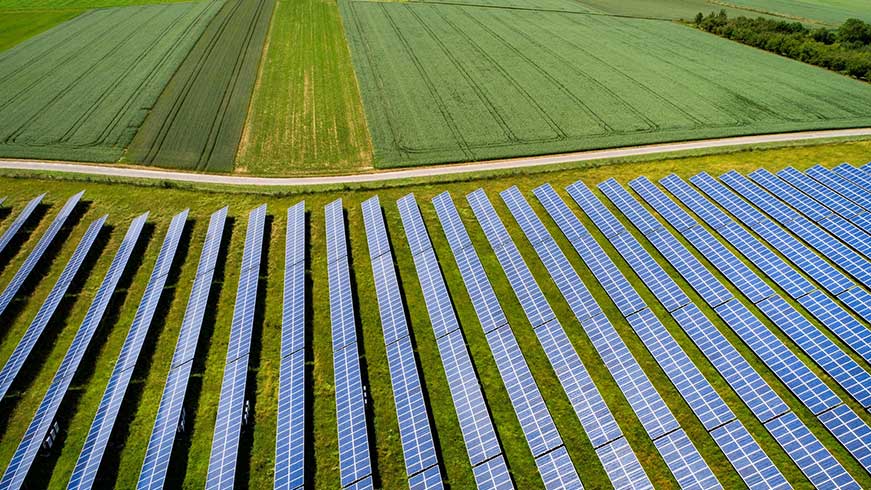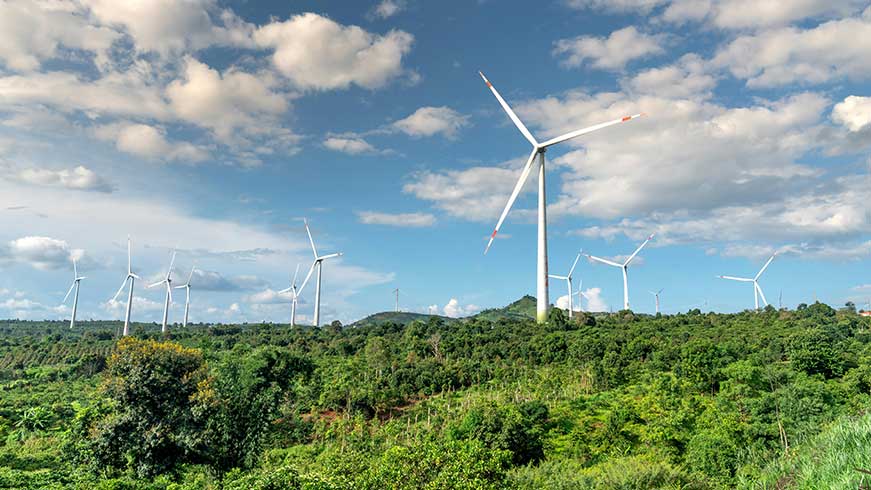Companies I-P

Lilly - Ireland's largest solar farm helps Lilly save 2,350 tonnes of CO2 annually
Lilly has partnered with the renewable energy company Enerpower to construct the single largest solar farm in the Republic of Ireland. The 16-acre facility will help power a significant proportion of Lilly’s biopharmaceutical manufacturing facility at Kinsale (near Cork) with sustainable energy. Comprising 12,600 individual panels, the ground-mounted Solar Farm will produce up to 5.6MW of power allowing Lilly to reduce its annual carbon footprint at the site by 2,350 tonnes.
This investment is a key part of Lilly’s global commitment to make its operations carbon neutral by 2030.
Johnson & Johnson Innovative Medicine are driving ambitious climate action to decarbonize our operations and value chain
Building on more than two decades of achieving carbon reduction targets, our current Health for Humanity climate goals are our most ambitious yet. We are transitioning to renewable electricity and carbon neutrality in our global operations while also working with suppliers to reduce our upstream carbon emissions.
More than 65% of our global electricity comes from renewable sources. In 2023 we reached the milestone of 100% renewable electricity for all operations in Europe.
By following climate science, we are doing our part to alleviate the impacts of climate change on human and planetary health. We reduced the carbon footprint of our operations by over 40% between 2016-2022.


MSD Ireland has installed and commissioned a 15 acre solar farm at its Ballydine site, reducing the company's carbon footprint by 2,336 tonnes every year1
The challenge:
MSD have adopted a set of climate goals to help position our Company to succeed in an increasingly resource-constrained world. These goals were developed to align with the latest climate science and address the rising expectations of our customers, investors, external stakeholders and employees regarding the environmental impact of our operations and supply chain.
To support MSD’s environmental sustainability efforts, MSD Ireland’s ‘See Green, Be Green’ program launched on World Earth Day 2021. This is a comprehensive, enterprise-wide and award-winning initiative to embed a sustainability mindset into its operations, creating a greener and healthier future.
As part of the initiative, a 15 acre solar farm was installed and commissioned in November 2022 at MSD Ballydine, reducing MSD Ireland’s carbon footprint by 2,336 tonnes every year1. Thermal heat pump assessments have also been completed, and retrofit projects are in progress including, the Ballydine Pharm Ops Electric Heat Pump (1200KW) retrospective project, replacing steam to heat heating, ventilation and air conditioning. MSD Ireland also has electric car chargers at all sites and electric fleet options for all eligible employees, whilst also supporting the cycle to work and public transport TaxSaver schemes. Both schemes reduce the cost of greener transport options.
1. MSD and ESB launch Ireland’s largest Solar project - MSD Ireland (msd-ireland.com)
MSD - commits to carbon neutrality across its operations by 2025
MSD commits to achieve carbon neutrality across its operations by 2025. It will reduce operational emissions 46% and value chain emissions 30% by 2030, from a 2019 baseline.
MSD has accelerated its previous goal of sourcing 100% renewable energy for purchased electricity by 15 years, to 2025, and has contracted new virtual power purchase agreements (VPPAs) in Europe and the United States that will help achieve the target.
Our Low Carbon Transition Playbook includes a gap assessment for sites to evaluate the maturity of their energy programs and helps create plans to build toward a carbon-neutral future.


Novartis - by 2030, Novartis aims to be water neutral in all areas of operations
By 2025, Novartis aims to reduce water consumption in their operations by half versus 2016, with no water quality impacts from manufacturing waste, and aim to be water neutral by 2030.
They have built a new wastewater treatment plant in Romania, equipped with the latest carbon-filter technology to better purify water from active pharmaceutical ingredients
Novartis - production technologies can save 5 million tonnes of CO2 by 2030
The production of some types of medicine requires solvents and, in several cases, precious metal catalysts with very high greenhouse gas impact. In most of Novartis’s manufacturing facilities they recover, recycle and re-use solvents and catalysts.
For two pilot compounds Novartis was able to demonstrate a recovery rate of 75-85% of two precious metals, with potential savings of 20,000 tons of CO2 by 2030.
The company is also using cutting-edge technologies to reduce the volume of materials required to produce drug substances. These have the potential to save 5 million tons of CO2 by 2030.


Novartis - will achieve 100% renewable energy in Europe by 2023
Novartis has set a target for full carbon neutrality in its own operations by 2025, and net zero across its value chain by 2040.
One project has consolidated medication shipments and saved emissions in more than 40 clinical trials. From 2021 Novartis will avoid an average of 18,000 shipments per year saving approximately 1,400 tons of CO2 annually.
Novartis ‘Green Expectations from Suppliers Framework’ and a Global Environmental Sustainability team are promoting ethical behaviours and fostering sustainability in their supply chain.
Orion - their Finnish operations moved to 100% renewable electricity in 2019
Orion corporation has worked to reduce its carbon footprint with numerous energy efficiency projects, and in 2019 moved to 100% renewable electricity in Finland. Orion has made a further commitment to achieve carbon neutrality in its own operations by 2030.
One strategic aim is to tackle the carbon impact of inhalers. Orion produces propellant-free powdered inhalers only, which have a carbon footprint 10-37 times lower than pressurised metered-dose inhalers. It has worked to minimise direct and indirect greenhouse gas emissions across its own operations, and that of its suppliers, within the products life cycle. Remaining unavoidable emissions have been offset through projects that protect the world’s lungs, including reforestation in the UK.


Pfizer - aims to achieve the Net-Zero Standard by 2040
Pfizer has reduced direct GHG emissions by more than 60 percent over the period 2001 to 2020 (2000 baseline) and as one of the first companies to receive validation of GHG reduction goals by the Science Based Target Initiative in 2015, Pfizer remains committed to ambitious long-term actions.
The company has set an ambition to achieve the Net-Zero Standard by 2040. To meet this goal, Pfizer is targeting a 95% reduction in direct (Scope 1&2) emissions and a 90% reduction in emissions across the value chain by 2040.
Last modified: 10 May 2024
Last reviewed: 10 May 2024
